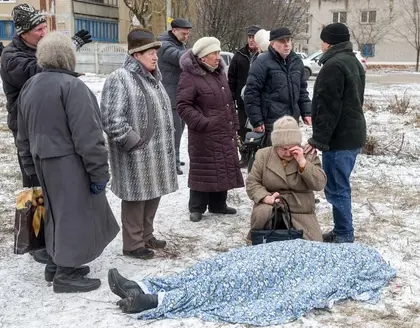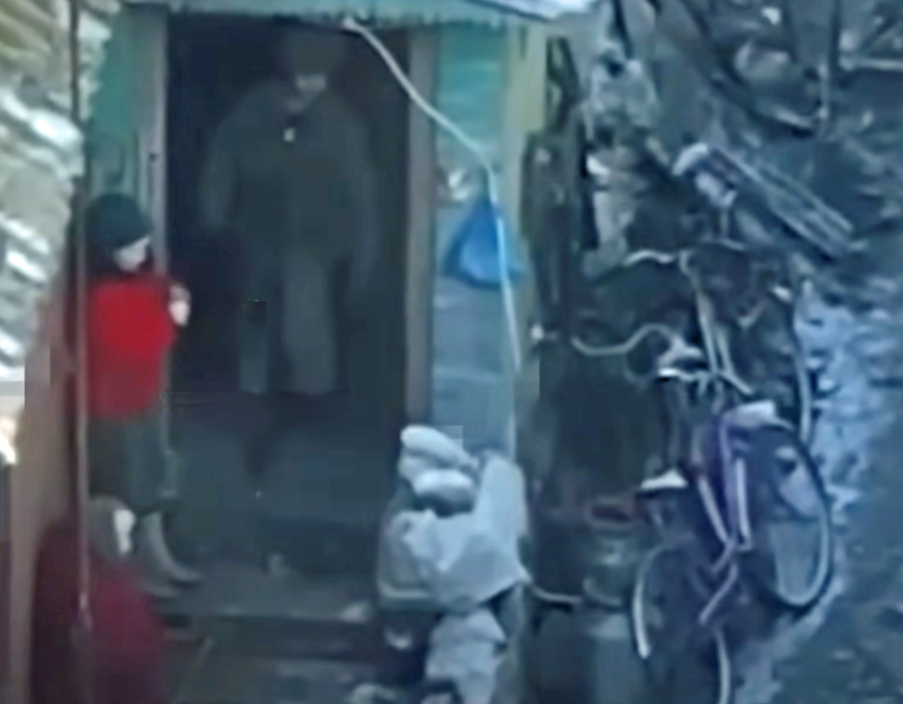Russian-backed fighters had launched a surprise attack on Ukraine’s military headquarters at Kramatorsk, some 80 kilometres from Ukrainian lines at Debaltseve, which appeared to have finally been cut off overnight. The surge in fighting casts a heavy shadow over high-level peace talks scheduled in Minsk for Feb. 11.
JOIN US ON TELEGRAM
Follow our coverage of the war on the @Kyivpost_official.
Separatist rockets land on a Kramatorsk suburb, Feb. 10 2015
“Heavy weapons, most
probably Smerch or Uragan, have been used today,” said Oleksandr Kikhtenko, the
pro-Kyiv governor of Donetsk Oblast.
- Obtain the most recent updates on the Ukraine situation today.
- Read the newest Ukraine news stories published today.
“They are definitely
produced in Russia. Their kill distance reaches 130 kilometers.” Kikhtenko
added that none of the cities located close to the frontline could feel safe as
long as the fights go on.
Residents of Kramatorsk, which has not seen fighting since
Ukraine recovered the city from insurgents in early July, were shocked by the
bloody attack. Photos of the dead and wounded spread like wildfire on social
networks.
In addition to the civilian losses, Donetsk Oblast authorities
reported that, as of 6 p.m., 32 soldiers had been injured. The medical
department would not release information about the number of soldiers killed,
but parliamentarian Iryna Herashchenko, the presidential representative on the
humanitarian situation in the east, said that four soldiers were killed over
the attack.
Vladislav Seleznez, spokesman for Ukraine’s General Staff, told
the Kyiv Post that Russian-backed separatists had used Smerch rocket systems
containing cluster munitions – prohibited by international conventions but
still used by Russia and Ukraine. “Our experts are now working at the scene and
have confirmed that cluster munitions were used,” he said. He was unable to
confirm the death of the four soldiers.
The attack was launched at about 12.30 p.m. from separatists’
positions in Horlivka city, located around 80 kilometers from Kramatorsk,
Ukraine’s Anti-Terrorist Operation press service reported.
Separatists also used Horlivka to stage a tank attack on Feb. 9,
seizing the village of Lohvynove in an attempt to cut off Ukrainian forces in
Debaltseve.
The town is already surrounded by rebel forces from three sides
and remains the scene of the most fierce fighting on the front. Seven Ukrainian
soldiers were killed and 24 wounded in the past 24 hours, Lt. Colonel Andriy
Lysenko, the spokesman for the Anti-Terrorist Operation, reported. Medical
sources say the true number of military losses is likely to be three times
as high.
Ruslan Petrenko, a volunteer supplying goods and equipment to
the Ukrainian army in the town of Artyomovsk, told the Kyiv Post that he had
seen tanks charging at Ukrainian forces along the road road connecting
Debaltseve and Artyomovsk at about 11 a.m. on Feb 9. The road had been
Ukraine’s only supply route between Ukrainian-held territory and besieged
Ukrainian positions at Debaltseve.
He said Ukrainian forces had stepped up its artillery
bombardment of separatist positions in Horlivka overnight and hadn’t let up
since. “I can hear the sound of shells falling on Horlivka right now,” he said.
Petrenko added that several humanitarian corridors out of the
city, opened last week for the evacuation of civilians from the dangerous
areas, have now been closed. “The UN representatives and volunteers, who were
bringing food to the villages of Luhanske and Myronivskiy (both near
Debaltseve) and rescuing bedridden people from there couldn’t go there
yesterday as the roads were closed because of fighting,” he said.
Igor Ilkiv, head of the medical department of National Guard in
the Debaltseve area, said that there had been a sharp increase in the number of
killed and wounded soldiers and civilians over the last days. He said that two
of his ambulances were hit by shrapnel in Debaltseve on Feb. 9, but he had been
unable to rescue his medics trapped in the town, who he now fears are dead.
“We tried to reach [the wounded] late last night, almost reached
them, but they [the separatists] started shooting at us. So we returned to
avoid new deaths,” he told the Kyiv Post speaking by phone.
Despite being unable to get to Debaltseve, Ilkiv maintained that
there was still was some connection with Ukrainian positions in the town and
that Lohvynove, which is located on the way to the city, remained partly under
control of Ukrainian forces.
Hennadiy Moskal, the governor of Luhansk Oblast, reported there
was now house-to-house fighting at Chornyhune village, located 14 kilometers from Debaltseve.
“There are street fights in Chornukhyne between the Ukrainian
soldiers on one side and insurgents and Russian soldiers on the other one,” he
wrote on his Facebook page, calling the situation a “humanitarian catastrophe.”
Moskal added that the residents were sitting in cellars without
any chance to leave the village as the roads out of it are under constant
bombardment. The shells destroyed a local prison and the convicts and their
jailers are now hiding in the village.
The fighting in eastern Ukraine has now killed at least
5,486 people and left almost 13,000 wounded, according to UN report released on
Feb. 9.
The drastic escalation of the war takes place on the eve of
fresh peace talks in Minsk, where the Trilateral Contact Group, made up of
representatives from Ukraine, Russia and OSCE, with the participation of
representatives of self-proclaimed Donetsk and Luhansk People’s Republics, is
due to meet for a new round of negotiations at 6 p.m. on Feb. 10.
The meeting may be followed up by a Normandy-format meeting in
Minsk of French, German, Ukrainian and Russian leaders, but only if the work of
the contact group is deemed successful, Russian ITAR-TASS news agency quoted
Russian Deputy Foreign Minister Grigoriy Karasin as saying.
German Chancellor Angela Merkel, during her trip to Washington
on Feb. 9, reiterated that she continues to see Europe as a key player in the
Russia-Ukraine conflict.
“We are called upon now to come up with solutions, not in the
sense of a mediator, but we also stand up for the interests of the European
peaceful order,” she said at a press briefing in the White House.
EU foreign ministers on Feb. 9 approved new visa bans and asset
freezes on more Ukrainian separatists and Russians but postponed the
implementation of additional sanctions until Feb. 16 in order to give the peace
negotiations a chance.
Those talks have been described by French President Francois
Hollande as “the last chance.” In the meantime, Wall Street Journal reported on
Feb. 9 that Chancellor Merkel gave Putin until Feb. 11 to accept a road map to
end of fighting in Ukraine, or else Germany will likely move to step up
European sanctions against Russian companies, possibly including broader asset
freezes.
Russian President Vladimir Putin gave no indication that he was
planning to accept the ultimatum. In his interview to Egyptian newspaper
Al-Ahram he laid out his own preconditions for the peace talks in Minsk.
“The most important condition for stabilization of the situation
is an immediate cease-fire, the so-called Anti-Terrorist, but in essence, a
punitive operation, in the south-east of Ukraine,” he told the newspaper.
“Any attempts by Kyiv to economically pressure Donbass, block
its vital activities are complicating the situation. This is a dead-end,
which threatens to turn into a big catastrophe.”
Kyiv Post staff writer Oksana Grytsenko can be reached at [email protected],
and Kyiv Post editor Katya Gorchinskaya can be reached at [email protected]
You can also highlight the text and press Ctrl + Enter




